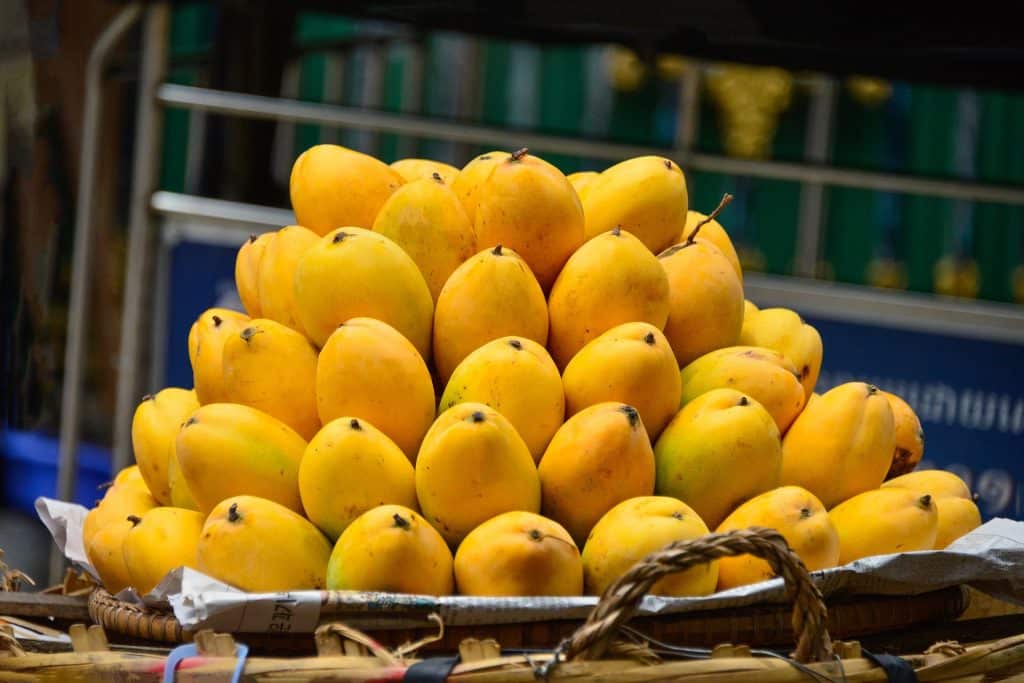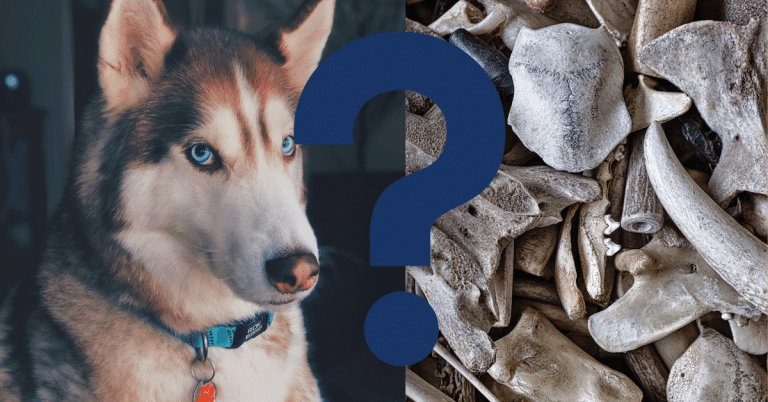Can Dogs Eat Mangoes? A Vet’s Opinion

Mangoes are tropical stone fruit which has a very distinct sweet taste. Mangoes contain a ton of health benefits. This fruit contains a fleshy outer region, which is characteristically yellow in colour. This flesh surrounds the pit of the fruit, which contains a large seed in the middle, but can you feed mangos to your dog?
Yes, you can give your dog mangoes to eat in his diet; however, make sure that the mangoes are given in moderation. The mangoes can be an excellent treat since they are sweet and full of nutrition. Mangoes are abundantly found and are easy to prepare for your dogs; ensure to remove the outer skin and the pit containing the seed before giving it to your dog to eat!
Let’s dive in:
Benefits Of Mangoes For Dogs
Mangoes are great for your dog if given in moderation. Your dog will love the sweet fruit, and hence it can be used as a treat as well. Mangoes are a rich source of essential vitamins like Vitamin A, Vitamin B6, Vitamin C, and Vitamin E. Vitamin B6 is an excellent antioxidant as well, which means it helps your dog’s body to get rid of the free radicals, which will harm your dog’s immune system.
Moreover, mangoes are high in fibre. Fibre is essential for the bowel movements of your dog. Fibrous content can help with the absorption of nutrients as well. The gut will get strengthened if fibre is made a part of your dog’s daily diet. Mangoes can also help with satiation, so you can control the number of calories your dog eats as well. Lastly, mangoes are high in a compound called Carotene, which is vital for healthy eye function, can help lower cancer risk in the eye and protect the body from free radicals.

How To Safely Give Mangoes To Dogs
There are a number of ways in which you can give mangoes to your dog. One of the ways is to dehydrate or dry ageing the fruit before giving it to your dog. The idea behind this is to intensify the flavour. While it is true, you should definitely make sure not to give your dog the normal portions of dried-out fruit because, in the case of mangoes, the taste is now condensed, which means the sugars are condensed, and it will deliver more of a sweet punch. This can be a problem if your dog is diabetic, so you generally want to limit the calories your puppy takes. Moreover, make sure to avoid getting store-bought dried-out mangoes for your pup, as they will mostly contain more syrup, which in turn means more sugar along with preservatives which are not suitable for the general health of your dog.
How many mangoes you decide to give to your dog depends solely on their size, appetite and existing health condition. You can give 2-3 pieces of mango to your dog if it weighs around 21 to 30 pounds, to all the way giving a handful of a whole mango to your dog if they are more than 90 pounds. Hence, it is best to contact a vet before making a diet chart for your puppy to ensure that all the macros are aligned according to the body weight and composition of your dog. There are several ways to give your mangoes; one of the simplest ways is to feed them raw mango cubes. Moreover, you can mash the mango pieces to make a paste out of them and mix it with other things; this will make it more convenient for you as a dog owner. If you are from a warmer climate and want to keep cool during the summers, we suggest you freeze some mangoes mixed with water to make a sort of ice cream treat for your dog to feed on during those extra hot afternoons. Similarly, you can mix mangoes with some other fruits and yoghurt for your dog to eat. Some of the fruits you can mix include blueberries, watermelon and bananas.
Will Mangoes Make A Dog Sick?
The mango will not make your dog sick directly. The mango has some parts that may not be beneficial for your dog. The skin of the mango has to be peeled off before giving it to your dog due to many reasons. The skin of the mango is tough since it is supposed to protect the mango. This is why it is very hard to chew as well, and if your dog tries to swallow it whole, it might become a severe hazard. This is why we suggest you remove it before feeding it to your dog. Apart from the skin, the mango pit, which has the seed, could be more helpful and nutritious for your and should be avoided when feeding your dogs mangoes. The seed of the mango is enormous in size and can cause a choking hazard. Moreover, it is so large that it can get stuck inside the gastral tract, which can cause a lot of pain and discomfort to your dog. Hence, it’s vital to get rid of it. Moreover, like most fruit seeds, mango seed contains a tiny amount of cyanide. This poisonous compound, if eaten in enough quantity, can kill you. Hence, this is another reason to avoid giving your dog mango pits.
Mangoes are incredibly sweet, and if your dog has diabetes or low insulin levels, this can seriously have life-threatening implications if your dog eats too many mangoes. On average, mangoes contain roughly 50 milligrams of sugar per fruit. This much sugar can again result in diabetes, tooth decay and obesity. Mangoes, with their high sugar and fibre content, can trigger diarrhoea in dogs and can cause an upset stomach as well; hence it’s best to give small pieces of mangoes to your dog before making sure that their digestive systems are strengthened enough to handle more! Some dogs can develop mango allergy as well due to a compound called urushiol in them. This compound is allergic to humans and dogs and can be found in plants like poison oak or ivy. Ensure that your dog does not have any existing allergies to such compounds before making mangoes a regular part of their diet.

Vet’s Summary
You can give mangoes to your pet as a part of their diet, as they contain numerous benefits. Mangoes contain Vitamin A, Vitamin B6, Vitamin C, Vitamin E. These vitamins, in addition to the presence of minerals, help to protect and repair the body’s various systems. However, mango should be given as an occasional treat with strict portion control since they are high in sugar and can result in diabetes and other problems like tooth decay. Mangoes should always be fed in moderation to avoid any gastrointestinal issues, including the fact that there are some essential precautions to take while feeding your dog mangoes, such as removing the skin and the seed! Apart from mangoes, we suggest you introduce probiotics into your dog’s daily diet. Probiotics are essentially healthy bacteria that are responsible for a healthy gut! You should add some probiotics to your dogs’ diet to help them clear off any gut problems or digestive issues they might face with age! Probiotics can also help fight digestive issues, such as diarrhoea and constipation, and reduce the risk of infections. However, you should always consult your local veterinarian in deciding which supplements and probiotics will be beneficial for your pet friend!
Videos To Watch
If you are wondering what related foods are good to give your dog, watch this:
And if you want to know what a dog can NOT eat, watch this:






